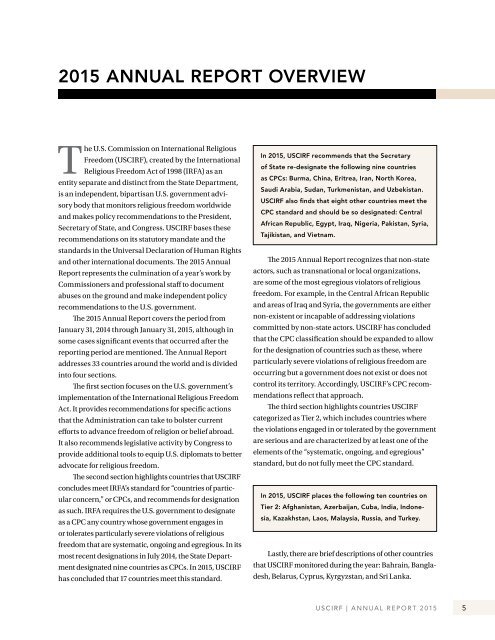USCIRF Annual Report 2015 (2)
USCIRF Annual Report 2015 (2)
USCIRF Annual Report 2015 (2)
You also want an ePaper? Increase the reach of your titles
YUMPU automatically turns print PDFs into web optimized ePapers that Google loves.
<strong>2015</strong> ANNUAL REPORT OVERVIEW<br />
The U.S. Commission on International Religious<br />
Freedom (<strong>USCIRF</strong>), created by the International<br />
Religious Freedom Act of 1998 (IRFA) as an<br />
entity separate and distinct from the State Department,<br />
is an independent, bipartisan U.S. government advisory<br />
body that monitors religious freedom worldwide<br />
and makes policy recommendations to the President,<br />
Secretary of State, and Congress. <strong>USCIRF</strong> bases these<br />
recommendations on its statutory mandate and the<br />
standards in the Universal Declaration of Human Rights<br />
and other international documents. The <strong>2015</strong> <strong>Annual</strong><br />
<strong>Report</strong> represents the culmination of a year’s work by<br />
Commissioners and professional staff to document<br />
abuses on the ground and make independent policy<br />
recommendations to the U.S. government.<br />
The <strong>2015</strong> <strong>Annual</strong> <strong>Report</strong> covers the period from<br />
January 31, 2014 through January 31, <strong>2015</strong>, although in<br />
some cases significant events that occurred after the<br />
reporting period are mentioned. The <strong>Annual</strong> <strong>Report</strong><br />
addresses 33 countries around the world and is divided<br />
into four sections.<br />
The first section focuses on the U.S. government’s<br />
implementation of the International Religious Freedom<br />
Act. It provides recommendations for specific actions<br />
that the Administration can take to bolster current<br />
efforts to advance freedom of religion or belief abroad.<br />
It also recommends legislative activity by Congress to<br />
provide additional tools to equip U.S. diplomats to better<br />
advocate for religious freedom.<br />
The second section highlights countries that <strong>USCIRF</strong><br />
concludes meet IRFA’s standard for “countries of particular<br />
concern,” or CPCs, and recommends for designation<br />
as such. IRFA requires the U.S. government to designate<br />
as a CPC any country whose government engages in<br />
or tolerates particularly severe violations of religious<br />
freedom that are systematic, ongoing and egregious. In its<br />
most recent designations in July 2014, the State Department<br />
designated nine countries as CPCs. In <strong>2015</strong>, <strong>USCIRF</strong><br />
has concluded that 17 countries meet this standard.<br />
In <strong>2015</strong>, <strong>USCIRF</strong> recommends that the Secretary<br />
of State re-designate the following nine countries<br />
as CPCs: Burma, China, Eritrea, Iran, North Korea,<br />
Saudi Arabia, Sudan, Turkmenistan, and Uzbekistan.<br />
<strong>USCIRF</strong> also finds that eight other countries meet the<br />
CPC standard and should be so designated: Central<br />
African Republic, Egypt, Iraq, Nigeria, Pakistan, Syria,<br />
Tajikistan, and Vietnam.<br />
The <strong>2015</strong> <strong>Annual</strong> <strong>Report</strong> recognizes that non-state<br />
actors, such as transnational or local organizations,<br />
are some of the most egregious violators of religious<br />
freedom. For example, in the Central African Republic<br />
and areas of Iraq and Syria, the governments are either<br />
non-existent or incapable of addressing violations<br />
committed by non-state actors. <strong>USCIRF</strong> has concluded<br />
that the CPC classification should be expanded to allow<br />
for the designation of countries such as these, where<br />
particularly severe violations of religious freedom are<br />
occurring but a government does not exist or does not<br />
control its territory. Accordingly, <strong>USCIRF</strong>’s CPC recommendations<br />
reflect that approach.<br />
The third section highlights countries <strong>USCIRF</strong><br />
categorized as Tier 2, which includes countries where<br />
the violations engaged in or tolerated by the government<br />
are serious and are characterized by at least one of the<br />
elements of the “systematic, ongoing, and egregious”<br />
standard, but do not fully meet the CPC standard.<br />
In <strong>2015</strong>, <strong>USCIRF</strong> places the following ten countries on<br />
Tier 2: Afghanistan, Azerbaijan, Cuba, India, Indonesia,<br />
Kazakhstan, Laos, Malaysia, Russia, and Turkey.<br />
Lastly, there are brief descriptions of other countries<br />
that <strong>USCIRF</strong> monitored during the year: Bahrain, Bangladesh,<br />
Belarus, Cyprus, Kyrgyzstan, and Sri Lanka.<br />
<strong>USCIRF</strong> | ANNUAL REPORT <strong>2015</strong> 5


